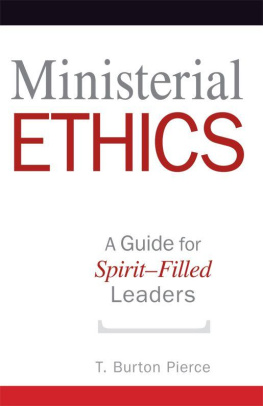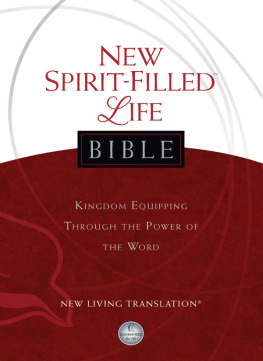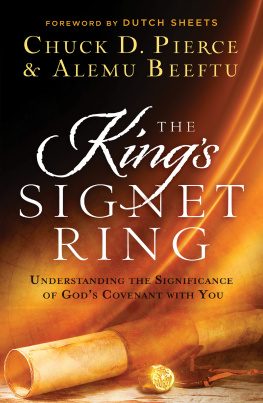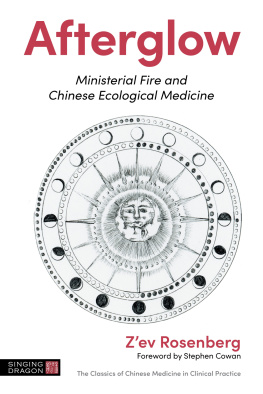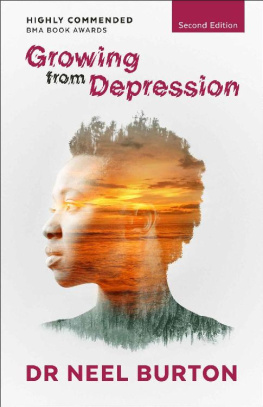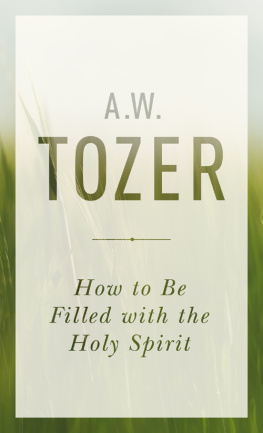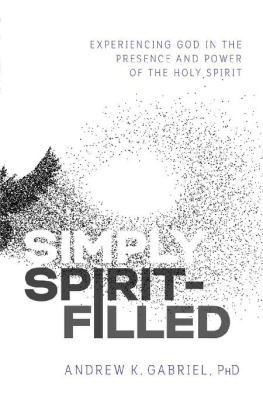T. Burton Pierce - Ministerial Ethics: A Guide for Spirit-Filled Leaders.epub
Here you can read online T. Burton Pierce - Ministerial Ethics: A Guide for Spirit-Filled Leaders.epub full text of the book (entire story) in english for free. Download pdf and epub, get meaning, cover and reviews about this ebook. year: 0, genre: Religion. Description of the work, (preface) as well as reviews are available. Best literature library LitArk.com created for fans of good reading and offers a wide selection of genres:
Romance novel
Science fiction
Adventure
Detective
Science
History
Home and family
Prose
Art
Politics
Computer
Non-fiction
Religion
Business
Children
Humor
Choose a favorite category and find really read worthwhile books. Enjoy immersion in the world of imagination, feel the emotions of the characters or learn something new for yourself, make an fascinating discovery.
- Book:Ministerial Ethics: A Guide for Spirit-Filled Leaders.epub
- Author:
- Genre:
- Year:0
- Rating:5 / 5
- Favourites:Add to favourites
- Your mark:
- 100
- 1
- 2
- 3
- 4
- 5
Ministerial Ethics: A Guide for Spirit-Filled Leaders.epub: summary, description and annotation
We offer to read an annotation, description, summary or preface (depends on what the author of the book "Ministerial Ethics: A Guide for Spirit-Filled Leaders.epub" wrote himself). If you haven't found the necessary information about the book — write in the comments, we will try to find it.
Ministerial Ethics: A Guide for Spirit-Filled Leaders.epub — read online for free the complete book (whole text) full work
Below is the text of the book, divided by pages. System saving the place of the last page read, allows you to conveniently read the book "Ministerial Ethics: A Guide for Spirit-Filled Leaders.epub" online for free, without having to search again every time where you left off. Put a bookmark, and you can go to the page where you finished reading at any time.
Font size:
Interval:
Bookmark:
Ministerial
ETHICS
A Guide for
Spirit-Filled
Leaders
T. Burton Pierce
General Editor: Stanley M. Horton

Scripture quotations marked (NCV) are taken from the New Century Version. Copyright 1987, 1988, 1991 by Thomas Nelson, Inc. Used by permission. All rights reserved.
Scripture quotations marked (NKJV) are taken from the New King James Version. Copyright 1982 by Thomas Nelson, Inc. Used by permission. All rights reserved.
Scripture quotations marked (NRSV) are taken from the New Revised Standard Version Bible, copyright 1989, Division of Christian Education of the National Council of the Churches of Christ in the United States of America. Used by permission. All rights reserved.
Scripture quotations marked (Phillips) are taken from The New Testament in Modern English, copyright 1958, 1959, 1960 J.B. Phillips and 1947, 1952, 1955, 1957 The MacMillian Company, New York. Used by permission. All rights reserved.
Scripture quotations marked (RSV) are taken from the Revised Standard Version of the Bible, copyright 1952 [2nd edition, 1971] by the Division of Christian Education of the National Council of the Churches of Christ in the United States of America. Used by permission. All rights reserved.
Scripture quotations marked (TLB) are taken from The Living Bible 1971 by Tyndale House Publishers, Inc. Used by permission. All rights reserved.
Unless otherwise indicated, Scripture quotations taken from The Holy Bible, New International Version. NIV. Copyright 1973, 1978, 1984 by Biblica, Inc. TM Used by permission. All rights reserved worldwide.
The NIV and New International Version are trademarks registered in the United States Patent and Trademark Office by Biblica, Inc. TM
1996, 2011 by Gospel Publishing House, Springfield, Missouri, 65802. All rights reserved. No part of this book may be reproduced, stored in a retrieval system, or transmitted in any form or by any meanselectronic, mechanical, photocopy, recording, or otherwisewithout prior written permission of the copyright owner, except brief quotations used in connection with reviews in magazines or newspapers.
Library of Congress Cataloging-in-Publication Data
Pierce, T. Burton, 1926
Ministerial ethics: a guide for Spirit-filled leaders/T. Burton Pierce; Stanley M. Horton, general editor.
p. cm.
Includes bibliographical references and indexes
ISBN
1. ClergyProfessional ethics. 2. Pentecostal churchesClergyProfessional ethics. 4. Pastoral theologyPentecostal churches. 5. Christian ethicsAssemblies of God authors. 6. Assemblies of GodDoctrines. 7. Pentecostal churchesDoctrines. I. Horton, Stanley M. II. Title.
BV4011.5P54 1996
241.641dc20 933636
Contents
As ministers of the gospel we have a responsibility both to declare the truth and to live the truth. This involves both our relationship to God and to others. It means living in a way that upholds the ethical standards for conduct that the Bible teaches. In a day when relativism is rampant, the Bible still points us to Gods own character as the standard we must, with the help of the Holy Spirit, strive to follow. It is not enough the follow the norms that the world around us accepts as ethical ().
To act ethically in a way that pleases God, we must seek to be like the Father, which also means to be like Jesus who reveals the Father (). In other words, the Israelites could not even begin to keep the Ten Commandments in a way that pleased God unless their whole being was going out to God in love.
The love God wanted was really a response to His love, for He loved them first (They had shown that faith by obedience as they sacrificed the Passover lamb, sprinkled its blood, and ate it with everyone dressed, packed up, and ready to go. The Book of Hosea demonstrated further that the kind of love God wanted included a loyalty that Israel throughout its history so often lacked.
Our response to His love must also make us a channel of His love to others. In the midst of the Law God said, Love your neighbor as yourself (). Just how necessary it is for believers to show this kind of love is one of the great themes of 1 John.
The Bible, however, does not make Gods love central to His character. In Isaiahs inaugural vision, the seraphim (burning ones) so reflected Gods glory they seemed to be on fire. But they did not call out, Love, love, love. They kept calling to one another: Holy, holy, holy is the LORD Almighty; the whole earth is full of his glory (). So Jesus, the sinless Lamb of God, fulfilled the entire sacrificial system as well as Isaiah 53 . He became our substitute and satisfied the holiness of God.
Gods holiness must be the standard of our holiness. Isaiah repeatedly calls Him the Holy One of Israel. God commanded Israel to consecrate themselves and be holy because He is holy (). Gods holiness has two aspects. The basic meaning of the Hebrew word for holiness is separation. On one hand, God is totally separate from all sin and evilquite unlike the false gods the pagans believed in, gods they thought could swap wives, kill each other, glorify drunken orgies, and do other evil deeds.
The other aspect of Gods holiness is related to His faithfulness. He has separated himself to the carrying out of His great plan of redemption and to the completing of His purpose to bless all the families of the earth ().
Jesus demonstrated these two aspects of holiness. He rejected Satans temptations, using something that is available to us: Gods Word ().
So, too, our holiness must have two aspects. We must turn our backs on sin and evil. We must also take up our cross and follow Jesus (ourselves to the worship and service of the Lord.
However, neither our holiness nor our love is a matter of mere human effort. Nor is it merely our human response to Gods holy love. Jesus was the divine Helper for His disciples while He was on earth. He restrained them when they wanted to bring fire down from heaven (). He does this not simply for us to enjoy, but to make us channels of that Calvary love, that self-giving love that is to extend even to our enemies.
The Holy Spirit also helps us along the highway of holiness. On the one hand, this means He helps us to reject sin and evil and guides us along the paths of righteousness (which in could be translated ruts of righteousness, well used by godly people who have gone before us and well marked in Scripture).
On the other hand, the Holy Spirit helps us dedicate ourselves to the worship and service of the Lord. He has gifts and ministry for every believer. But the Holy Spirit distributes His gifts not according to our desires but just as he determines ().
Our part is to be open to the Spirits guidance and responsive to His promptings. Believers are not to decide on their own what ministry they want to become involved in. Neither do we put one kind of ministry on a higher level, or consider it more important than others. emphasizes the importance of each member of the Body and the necessity and value of every ministry, including those that are unseen or in the background.
The Spirit will guide us in many ways. In the Book of Acts the Holy Spirit used several means. Sometimes He used circumstances, as when the persecution after the stoning of Stephen caused the believers, except the apostles, to scatter in all directions, preaching the Word wherever they went ().
Sometimes the Lord does use unusual means to turn people around. He did with Saul the persecutor on the Damascus Road ().
Acts has no formal ending. The acts of the Holy Spirit, along with His guidance and power, are meant to continue today. I found that out in a real way when God used various means to give direction to my life. When I was a student majoring in science at the University of California in Berkeley, some friends wanted me to quit the university, for they considered it a godless place. I prayed and could get no peace until I said, Lord, if You want me to finish and get my degree in science, I will. Then a warm feeling went from the top of my head to my toes. God knew a science background would be helpful in my future teaching.
Next pageFont size:
Interval:
Bookmark:
Similar books «Ministerial Ethics: A Guide for Spirit-Filled Leaders.epub»
Look at similar books to Ministerial Ethics: A Guide for Spirit-Filled Leaders.epub. We have selected literature similar in name and meaning in the hope of providing readers with more options to find new, interesting, not yet read works.
Discussion, reviews of the book Ministerial Ethics: A Guide for Spirit-Filled Leaders.epub and just readers' own opinions. Leave your comments, write what you think about the work, its meaning or the main characters. Specify what exactly you liked and what you didn't like, and why you think so.

